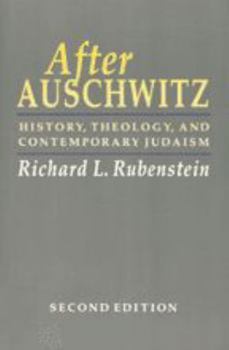After Auschwitz: History, Theology, and Contemporary Judaism
(Part of the Johns Hopkins Jewish Studies Series)
Select Format
Select Condition 
Book Overview
When first published in 1966, After Auschwitz made headlines and sparked controversy as Jewish death-of-God theology. But as the first work by a respected modern theologian to define the Holocaust in religious as well as demographic terms, its greater importance gradually emerged. Today it ranks as a seminal work of modern Jewish thought and culture. In this substantially revised and expanded edition, Richard L. Rubenstein returns to old...
Format:Paperback
Language:English
ISBN:0801842859
ISBN13:9780801842856
Release Date:May 1992
Publisher:Johns Hopkins University Press
Length:384 Pages
Weight:1.18 lbs.
Dimensions:0.9" x 6.2" x 9.0"
Related Subjects
Europe History Judaism Modern (16th-21st Centuries) Religion Religion & Spirituality Theology WorldCustomer Reviews
2 ratings
Professor Rubenstein was most fascinating & challenging
Published by Thriftbooks.com User , 19 years ago
Professor Rubenstein was my most fascinating and challenging professor at FSU during the 1970s. His range of intellectual inquiry makes him a "Renaissance" man. He has written numerous provocative and important books. This 1992 edition includes contemporaneus information and revisions to his views when the book was originally published in 1967. This book is likely his best and most challenging for Jews and Christians in particular.
Frightening--and therefore a must-read.
Published by Thriftbooks.com User , 25 years ago
In this (much) revised edition of the original After Auschwitz, Rubenstein provides not only some of the theological and social implications of the legacy of the Holocaust, but also looks to the future of Jewish theology.Most memorable--and certainly one of the best ways to approach reading this book is to use this as a starting point--is Rubenstein's radical reconsideration of covenant. In this, Rubenstein's revised work still stands among the Death-of-God theologians of the mid- and late-sixties (Altizer, etc.) in its rejection of "that" God who either could not or would not, but certainly did not save the victims of the Holocaust. And while his more-or-less continued rejection of the status of the Nazi's mass-murdered victims as martyrs is questionable and certainly uncomfortable, this is entirely in keeping with the theological position of the work. Also keeping with his theological position as it has developed is Rubenstein's suggestion that Jews will either assimilate or reaffirm traditional perspectives on covenant--if only because no other theological resources exist in the classical Jewish texts.Still chilling--and a must-read for anyone interested in post-trauma theologies--is the chapter discussing Rubenstein's meeting with Dean Gruber.My only problem with the book has little to do with the quality thought or consistency--it is an astounding combination of methodological rigor and very profound theological reflection. I do think, though, that the continued emphasis on process theology and the yet-unrejected Death-of-God thought as it is reflected in Rubenstein's personal theological statements (particularly the extended discussion of the Ground-of-being) is not sufficient for a religious community. However, Rubenstein admits as much, and it is unfair to disparage him for his obviously very well thought out opinions.Excellent and, for individuals who believe or do not believe, a necessary work for comprehending the implications of the Holocaust.





